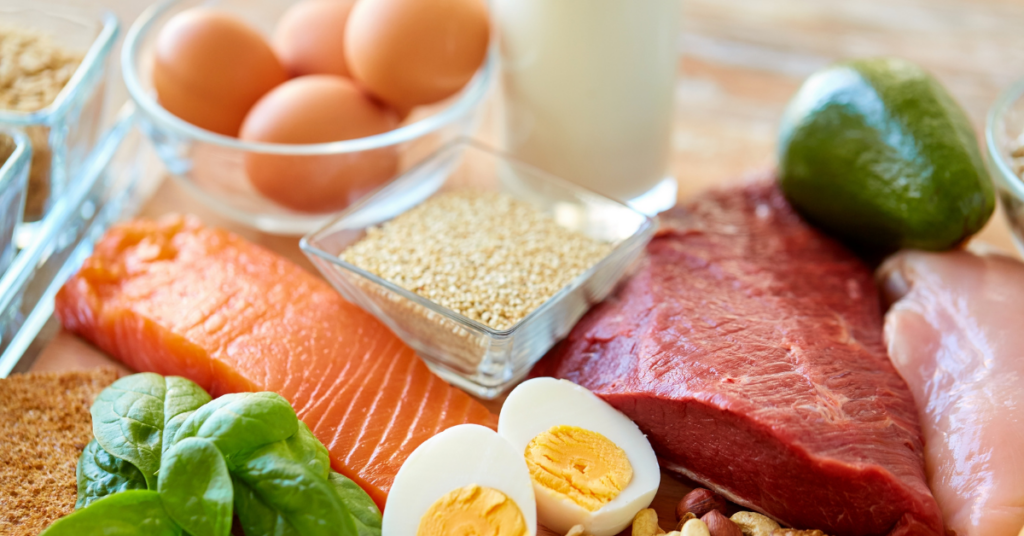How Sleep Impacts Eating and Body Composition
The hours we spend asleep are some of the most impactful for our mind and body; but how much sleep is enough? The amount of sleep we need changes throughout our lifetime, but once we hit adulthood (18 years and above), it is recommended that we aim for at least 7-9 hours of sleep per night (Centers for Disease Control and Prevention, 2022).
Sleeping less than the recommended amount does more than make us feel tired, foggy-headed, and irritable; it also has various health implications, such as an increased risk for high blood pressure, heart disease, stroke, kidney disease, and type 2 diabetes and a decreased ability to fight infections.
Additionally, research shows a strong relationship between sleep and body composition/weight (Crispim, 2007; Ding, 2018) and between sleep and eating habits. Regularly getting less than 7 hours of sleep can encourage changes that lead to an undesired increase in body weight and body fat, reduce muscle building, and even cause more muscle loss and less fat loss when losing weight (Cooper, 2018; Markwald 2013; Nedeltcheva, 2010).
Here are some of the mechanisms that may explain these findings.
Inadequate sleep can lead to eating excess calories by:
- Increasing desire for food – specifically, foods higher in sugar, fat, and overall calories (McNeil, 2017).
- Increasing snacking. When sleeping less, people tend to snack more (Heath, 2012). Snack intake is often added to calories already consumed in meals and can lead to excess intake overall.
- Increasing hunger. When you don’t sleep enough, hunger hormones are altered to make you feel hungrier even if your body doesn’t need more food (reduced leptin and increased ghrelin). These hormonal changes appear to impact women more than men.
- Increasing food intake management over a longer duration each day. You may eat excess calories simply because you are awake for more hours each day.
Inadequate sleep can impact movement and exercise by:
- Increasing feelings of fatigue. Being tired can cause an automatic decrease in how much you move your body and reduce your desire to exercise. Moving less and expending less energy makes it more challenging to reduce body fat and to complete your lifting program to put on muscle.
In addition to the impacts of eating more and moving less, inadequate sleep impacts body composition change by:
- Reducing the amount of fat used as fuel. One study found more muscle loss, less fat loss and less fat used as fuel when the participants slept less than 5.5 hours (Nedeltcheva, 2010).
- Impacting muscle recovery and growth. Inadequate sleep is associated with lower levels of muscle protein synthesis and hormones that support muscle growth and recovery (Lamon, 2021)
Diet and Sleep
Research has found that overall the types of foods you eat or the macronutrient ratios you consume do not seem to matter and only three dietary factors impact sleep: the timing and size of the last meal before bed, caffeine intake, and alcohol.
Last meal before bedtime
There is an increased risk of experiencing symptoms such as reflux, heartburn, and other gastrointestinal discomforts that may impact sleep quality if you eat a large meal right before lying down (Chung, 2020; Piesman, 2007). Therefore, the recommendation is to have your last large meal at least 2-3 hours before bedtime. A small snack right before bed should be fine.
Caffeine intake
Don’t worry: I won’t steal your coffee. However, I want you to reconsider how much and when you drink it. Caffeine tolerance varies significantly across individuals and can take 2–10 hours to be entirely removed from your system. The recommendation is to consume no more than 400 mg daily and finish drinking caffeine by early afternoon to ensure it does not impact your sleep (Harvard School of Public Health, 2020).
Alcohol intake
While I’m not going to take all your booze away (promise 😊), the reality is that even in small amounts, alcohol intake does impact both your sleep quality and quantity (Roehrs, 2001). If you choose to drink, limit to the recommended 1-2 drinks, and try to drink them earlier in the evening so your body has more time to process the alcohol before you go to sleep.
Tips to Improve Sleep
In addition to making these changes to your dietary intake patterns, improving your overall sleep hygiene practices can greatly impact the length and quality of your sleep. The National Institutes of Health has compiled a great list of tips to help you sleep better (National Institutes of Health).
Some of those tips include:
- Remove distractions from your room. I will always say that the best decision I’ve ever made for my health has been to put my phone charger in my kitchen and leave my phone there every night!
- Set up a sleep schedule. Go to bed and wake up at the same time every day, and make sure the times you plan for sleep get you to that 7-hour minimum!
- Exercise regularly but not too late in the day. Plan exercise at least 2-3 hours before bedtime to give your body time to cool off and slow down before trying to sleep.
- Relax before bed by reading, taking a bath, or other non-screen-requiring options.
- Keep the temperature cool in your bedroom.
Focusing on improving your sleep hygiene can positively impact progress toward your goals. A dedicated Stronger U Coach can work with you to review the 24 hours in your day and help you address dietary habits and lifestyle factors that may impact your sleep quality. From there, they can help you develop a plan that includes fitting in 7 hours of sleep while still supporting your other priorities. Schedule a free consultation to learn more about the benefits of becoming a Stronger U member and how to get matched with a coach.
References
Centers for Disease Control and Prevention (2022). Are you getting enough sleep? https://www.cdc.gov/sleep/features/getting-enough-sleep.html
Chung N, et al. (2020). Does the Proximity of Meals to Bedtime Influence the Sleep of Young Adults? A Cross-Sectional Survey of University Students. International Journal of Environmental Research and Public Health. 17(8):2677. https://doi.org/10.3390/ijerph17082677
Cooper CB, et al. (2018) Sleep deprivation and obesity in adults: a brief narrative review. BMJ Open Sport & Exercise Medicine. 4:e000392. https://bmjopensem.bmj.com/content/bmjosem/4/1/e000392.full.pdf
Crispim CA, Zalcman I, Dáttilo M, et al. The influence of sleep and sleep loss upon food intake and metabolism. Nutr Res Rev. 2007;20(2):195-212. doi:10.1017/S0954422407810651
Ding C, Lim LL, Xu L, Kong APS. (2018) Sleep and Obesity. J Obes Metab Syndr. 27(1):4-24. doi:10.7570/jomes.2018.27.1.4
Harvard School of Public Health (2020). Caffeine. https://www.hsph.harvard.edu/nutritionsource/caffeine/
Heath G et al. (2012) The effect of sleep restriction on snacking behaviour during a week of simulated shiftwork, Accident Analysis & Prevention, 45, 62-67, https://doi.org/10.1016/j.aap.2011.09.028.
Lamon S. et al. (2021). The effect of acute sleep deprivation on skeletal muscle protein synthesis and the hormonal environment. Physiological Reports. 9(1), e14660. https://doi.org/10.14814/phy2.14660
Markwald R, et al. (2013). Impact of insufficient sleep on total daily energy expenditure, food intake, and weight gain. PNAS 110(4). https://doi.org/10.1073/pnas.1216951110
McNeil J et al. (2017). The effects of partial sleep restriction and altered sleep timing on appetite and food reward, Appetite, 109, 48-56, https://doi.org/10.1016/j.appet.2016.11.020.
National Institutes of Health. Healthy Sleep. https://medlineplus.gov/healthysleep.html
Nedeltcheva AV, Kilkus JM, Imperial J, Schoeller DA, Penev PD (2010) Insufficient sleep undermines dietary efforts to reduce adiposity. Ann Intern Med. 153(7):435-41. doi: 10.7326/0003-4819-153-7-201010050-00006.
Piesman, M et al. (2007) Nocturnal Reflux Episodes Following the Administration of a Standardized Meal. Does Timing Matter?. American Journal of Gastroenterology 102(10):p 2128-2134. https://journals.lww.com/ajg/abstract/2007/10000/nocturnal_reflux_episodes_following_the.4.aspx
Roehrs & Roth (2001). Sleep, Sleepiness, and Alcohol Use. Alcohol Research & Health. 25(2). https://www.ncbi.nlm.nih.gov/pmc/articles/PMC6707127/pdf/arcr-25-2-101.pdf








